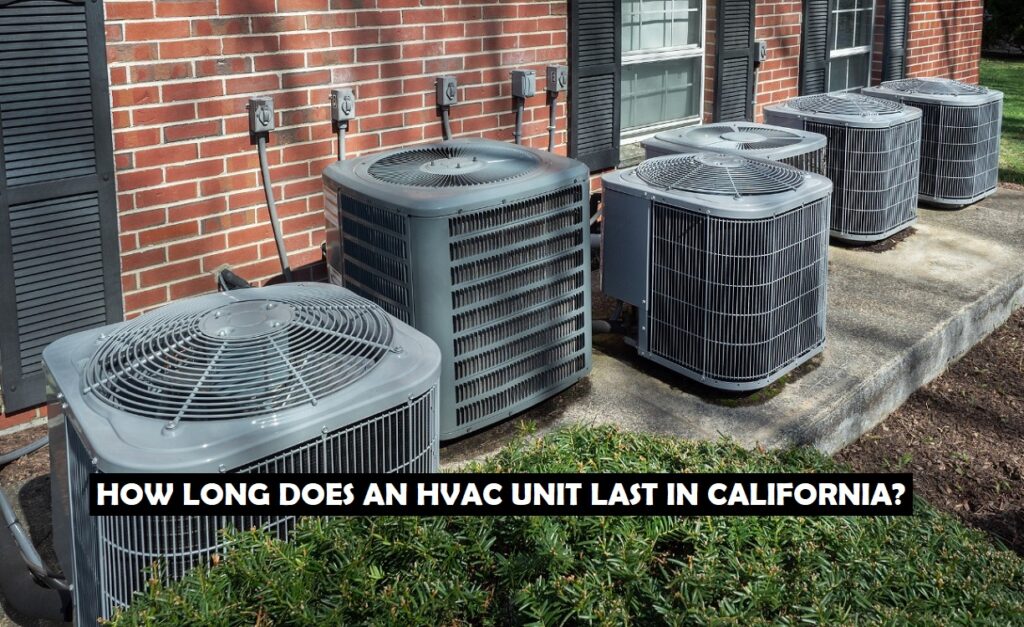If you’re a homeowner in California, you know the importance of having a reliable HVAC (Heating, Ventilation, and Air Conditioning) system, especially given the diverse climate across the state. But have you ever wondered how long these crucial systems last before needing replacement? In this article, we will explore the factors influencing the lifespan of HVAC units in California and offer essential tips to prolong their longevity.

Factors Affecting HVAC Lifespan
Several factors impact the lifespan of an HVAC unit in California. Let’s delve into each of these factors:
Climate in California
The climate in California can be harsh and diverse, ranging from arid deserts to coastal humidity and mountainous cold. Extreme temperature fluctuations and high humidity levels can place additional stress on HVAC components, potentially shortening their lifespan.
Maintenance and Care
Regular maintenance is vital to ensure the optimal performance and longevity of your HVAC unit. Timely inspection, cleaning, and servicing by professionals can prevent minor issues from escalating into major problems that might lead to premature breakdowns.
Quality of Installation
The quality of the initial HVAC installation significantly impacts its lifespan. Proper installation ensures that the system operates efficiently and minimizes the risk of premature wear and tear.
Frequency of Use
Homes in California often rely on HVAC systems for extended periods due to the varying climate. Units that consistently run for more extended periods may experience more wear and tear, reducing their overall lifespan.
Average Lifespan of HVAC Units in California
The average lifespan of HVAC units can vary depending on the type and quality of the system. Let’s explore the typical lifespans of various HVAC units in California:
Central Air Conditioners
On average, well-maintained central air conditioners can last anywhere from 12 to 15 years in California.
Furnaces
Gas furnaces typically have a lifespan of 15 to 20 years, while electric furnaces may last up to 30 years with proper care.
Heat Pumps
Heat pumps, commonly used for both heating and cooling purposes, can last around 15 years.
Ductless Mini-Split Systems
Ductless mini-split systems can have a lifespan of 20 to 30 years, provided they receive regular maintenance.
Signs Your HVAC Unit Needs Replacement
As HVAC units near the end of their lifespan, they might exhibit certain signs that indicate the need for replacement:
Reduced Cooling or Heating Efficiency
If your HVAC system struggles to maintain a comfortable indoor temperature, it might be nearing the end of its lifespan.
Frequent Repairs
An aging HVAC unit may require frequent repairs as its components wear out and become less efficient.
Strange Noises or Odors
Unusual sounds or unpleasant odors emanating from your HVAC system are red flags that it might be time for a replacement.
Uneven Temperature Distribution
Uneven cooling or heating in different areas of your home can indicate that your HVAC unit is not functioning optimally.
Tips to Extend HVAC Lifespan
To maximize the longevity of your HVAC system, follow these essential tips:
Regular Maintenance
Schedule annual maintenance with a professional HVAC technician to keep your system running smoothly.
Proper Air Filter Replacement
Replace air filters regularly to prevent dust and debris from clogging the system and impeding airflow.
Thermostat Management
Use programmable thermostats to optimize temperature settings and reduce unnecessary strain on the HVAC unit.
Addressing Issues Promptly
Address any problems or malfunctions promptly to prevent further damage and extend the system’s lifespan.
Upgrading Your HVAC System
When your HVAC unit nears the end of its lifespan, consider upgrading to a newer, more energy-efficient model. Benefits of upgrading include:
- Increased Energy Efficiency: Newer systems are designed to be more energy-efficient, leading to cost savings on your utility bills.
- Cost Savings: Improved efficiency and fewer repairs result in long-term cost savings.
- Environmentally Friendly Options: Many modern HVAC systems use eco-friendly refrigerants and have a reduced environmental impact.
In conclusion, the lifespan of an HVAC unit in California can vary depending on factors such as climate, maintenance, and frequency of use. By following regular maintenance practices and promptly addressing issues, you can extend the life of your HVAC system. When it’s time for a replacement, consider upgrading to a more energy-efficient and environmentally friendly model.




